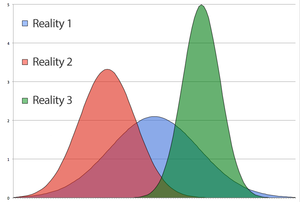Consensus Reality: Difference between revisions
mNo edit summary |
mNo edit summary |
||
| Line 4: | Line 4: | ||
– '''Heraclitus, 2500 years ago''' | – '''Heraclitus, 2500 years ago''' | ||
The idea of ''consensus reality'' is that amongst the general populace there is a shared sense of facts. Theoretically, to prove its existence, one could survey a populace on specific topics and see where people agree. These agreements, amalgamated, would make the consensus reality which would serve as a unifying point of reference for society. Pre | The idea of ''consensus reality'' is that amongst the general populace there is a shared sense of facts creating a common view of reality. Theoretically, to prove its existence, one could survey a populace on specific topics and see where people agree (Figure 1). These agreements, amalgamated, would make the consensus reality which would serve as a unifying point of reference for society. | ||
Pre the internet era, due to more centralise sources of information larger consensus realities were prevalent. However, as the ubiquity of the internet evolved, news sources became consistently more decnetralised leading to more bespoke information served by algorithms which lent to [[Confirmation Bias|confirmation bias]]. More and more the idea of a signle consensus reality binding society in common perception has been slowly shattered into smaller and smaller subsets. | |||
Revision as of 01:04, 3 December 2023
"There is one world in common for those who are awake, but when men are asleep each turns away into a world of his own."
– Heraclitus, 2500 years ago
The idea of consensus reality is that amongst the general populace there is a shared sense of facts creating a common view of reality. Theoretically, to prove its existence, one could survey a populace on specific topics and see where people agree (Figure 1). These agreements, amalgamated, would make the consensus reality which would serve as a unifying point of reference for society.
Pre the internet era, due to more centralise sources of information larger consensus realities were prevalent. However, as the ubiquity of the internet evolved, news sources became consistently more decnetralised leading to more bespoke information served by algorithms which lent to confirmation bias. More and more the idea of a signle consensus reality binding society in common perception has been slowly shattered into smaller and smaller subsets.
